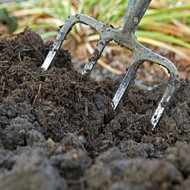February garden advice
Even though it's a mild early Spring so far it's still too cold to plant anything outside. Even if we're sowing inside there are very few things we can get started and they will need to be sown on a heat bench or propagator. We started sowing our Autumn Leeks this week (I've written a piece on it in the next section) but I want to cover getting your soil prepared as it's crucially important to the success of the coming year.
Looking after your soil For the gardener there is absolutely nothing more important than their soil. It is the life blood of the garden and will decide the success of your gardening endeavours. This is especially true of the vegetable gardener as the the healthy crops we harvest take a lot of nutrients from the soil to grow. These nutrients are removed when we pick our vegetables and need to be given back if we are to continue growing on the same patch of land.
Artificial fertilizers have allowed us to by-pass this simple rule by supplying the soluble nutrients direct to the plants. There are a number of problems with manufactured fertilizers but one of the worst is they slowly degrade the soil year after year until eventually the land becomes barren and unable to support life. When we think how important soil is to life on Earth we begin to understand how crazy this practice is.
So, how can I improve my soil?
The really good stuff in soil is rich organic matter. This is composted plant material and/or farmyard manure which is the food which feeds the soil, your plants and then you!
Good rotted compost can be added to the garden any time of the year but fresh manure should be added in the Autumn to allow it time to break down before you plant in Spring. Fresh manure is very high in quick release nitrogen and this can burn the new plant roots but also result in loads of leafy growth at the expense of the crop. You will get masses of lovely dark green potato foliage for example but only a few small potatoes.
The great news is even the worst soil can be brought back to life by adding plenty of organic matter every year.

But I didn't add any compost or manure last Autumn, what do I do now? The average garden won't be able to produce enough compost for continued growing even with the best managed system so we need to get our goodness elsewhere. If you are lucky and can get your hands on well rotted manure that will be perfect but make sure you dig it in well. As if you haven't guessed it already, we have another solution. We have been trialling an product from Donegal with Klaus Laitenberger for the last few years and can report excellent results. The product is 'Envirogrind', It's made from composted material and is a fabulous soil improver. Here's what's in it:
Food waste 40% - Fish waste 20% and green waste 40%. It goes through a 14 week process in a closed Vessel composting facility. It has to reach a temperature of 70 degrees to kill off pathogens and weed seeds. The result is a dark, crumbly odour free nutrient rich compost or vegetable gardeners rocket fuel. It also makes environmental sense, it's just home composting on a large scale.
What's so great about it?
- It's a very well balanced product with large amounts of potassium and potash as well as slow release nitrogen. It won't burn plant roots and will release nutrients over a number of years.
- It can be used as a soil improver or used neat in raised beds without any problems.
- It is completely weed free. Fresh manure can contain weeds like thistle and scutch grass or pests like flat worm or leatherjackets. Envirogrind is totally clear of any of these.
- It greatly increases crop yield. We added one bucket to a square metre of soil and left another without. The untreated metre gave us 2.5kg of potatoes while the envirogrind metre gave us 5kg. Maths wasn't my forte at school but even I can see that's double the yield.
- It is a natural product which recycles food and plant waste to turn it into a sustainable, peat free compost product.
Where can I get it? We now deliver large 1.2 cubic metre (approx 1 tonne) bags nationwide. It's a tricky one to shift as most of the cost goes into delivery but we really feel it's the missing link for many gardeners. We have 2 delivery rates, one for Dublin and another for the rest of the country, please see the bulk soil products in our soil and compost dept for more details.
